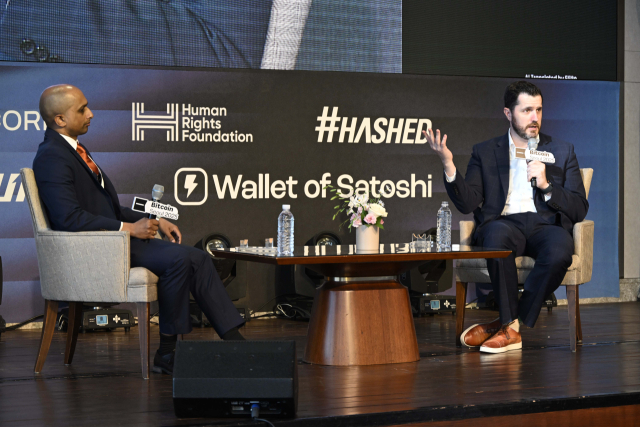
An analysis suggests that if President Lee Jae-myung's promised Bitcoin spot ETF and Korean won stablecoin issuance are realized, South Korea could quickly establish itself as a leading virtual asset country.
Dennis Porter, CEO of the Satoshi Action Fund, emphasized at the 'Bitcoin Seoul 2025 VIP Day' event held at the Signiel Seoul in Songpa-gu on the 4th, "The presence of a national leader who supports and backs the virtual asset industry, including Bitcoin or stablecoins, is very important."
The 'Bitcoin Seoul 2025', Asia's largest Bitcoin conference hosted by Seoul Economic Newspaper and co-organized by Decenter and Run & Imagine, will be held for three days from today to the 6th. This year's event will be attended by about 1,500 virtual asset experts, institutional investors, and financial institution representatives from over 30 countries.
Porter, who provided the theoretical background for coin reserves during the Trump administration, said, "Countries around the world are competing to lead in the virtual asset industry" and "The leader's will shall create a competitive difference within the next 5-10 years." He added, "President Lee is a figure who promised that the 884 billion dollar National Pension Fund can invest in Bitcoin and virtual assets" and "If the pro-virtual asset promises made by the Lee Jae-myung government are realized, South Korea could quickly become a leading virtual asset country."
During his presidential candidacy, President Lee promised to make South Korea a digital asset hub, announcing virtual asset spot ETF introduction and Korean won stablecoin issuance. The industry expects that, unlike the Yoon Suk-yeol government, which has taken a conservative stance on virtual asset industries, he will actively promote related industries. The United States, Hong Kong, Canada, and other major countries have already introduced virtual asset spot ETFs, and Japan is also accelerating the preparation of related legislation.
Stefan Rivera, a Bitcoin expert and famous podcaster who had a discussion with Porter on the topic of 'Bitcoin Policy of the Trump Administration', said, "While I know that President Lee has made pro-virtual asset promises, it is still uncertain whether they will actually be implemented" and "I hope he actively promotes policies in line with global trends."
The discussion also touched on stablecoins, where voices are emerging that national-level response is necessary. The financial sector is concerned that dollar stablecoins like Tether (USDT) and USD Coin (USDC) are infiltrating the domestic market by exploiting regulatory gaps, which could intensify national wealth outflow and disrupt monetary order. In response, there are many calls for South Korea to issue its own won stablecoin. Porter said, "It seems like a positive attempt, and the key will be where to find demand" and "Even if there is no demand outside the country, it can create tremendous value in its own financial market, so I believe everyone should attempt to issue stablecoins."
The event also introduced the Strategic Bitcoin Reserve (SBR) plan being pursued by the US government. The Satoshi Action Fund, led by Porter, is a non-profit organization leading SBR legislation in the United States. They have passed eight pro-Bitcoin bills and are conducting legislative foundation activities such as voter petitions and research reports.
New Hampshire was the first state in the US to pass an SBR bill. The HB 302 bill passed on May 6th allows up to 5% of state reserves to be allocated to Bitcoin. Arizona passed its bill the next day on May 7th. Arizona's SBR bill is designed to accumulate Bitcoin without separately allocating a budget. Porter said, "Arizona showed the entire nation the path of transforming abandoned assets into inflation-resistant assets" and "They developed a fiscal strategy that does not increase taxpayer burden." Texas has also sent its SBR bill, which passed both the House and Senate, to the governor.
- Reporters Shin Jung-seop, Do Ye-ri
< Copyright ⓒ Decenter, reproduction and redistribution prohibited >







